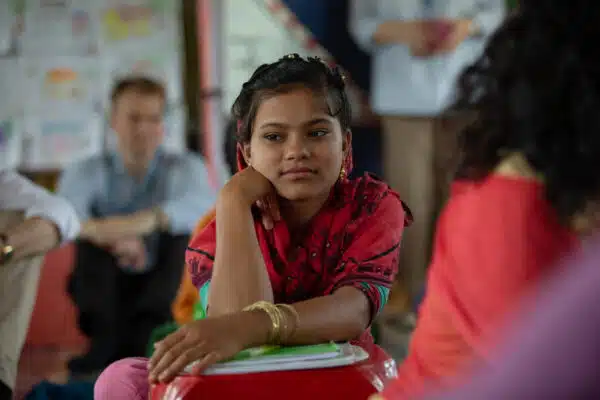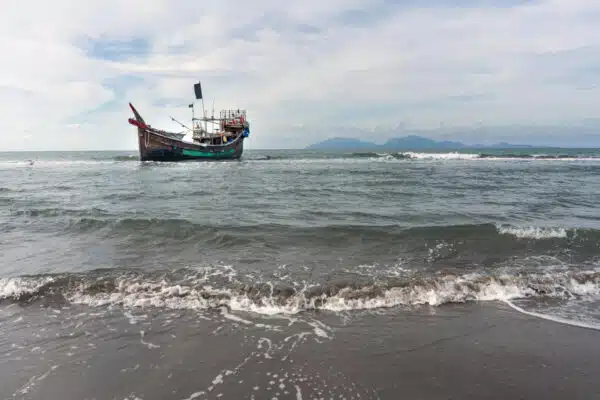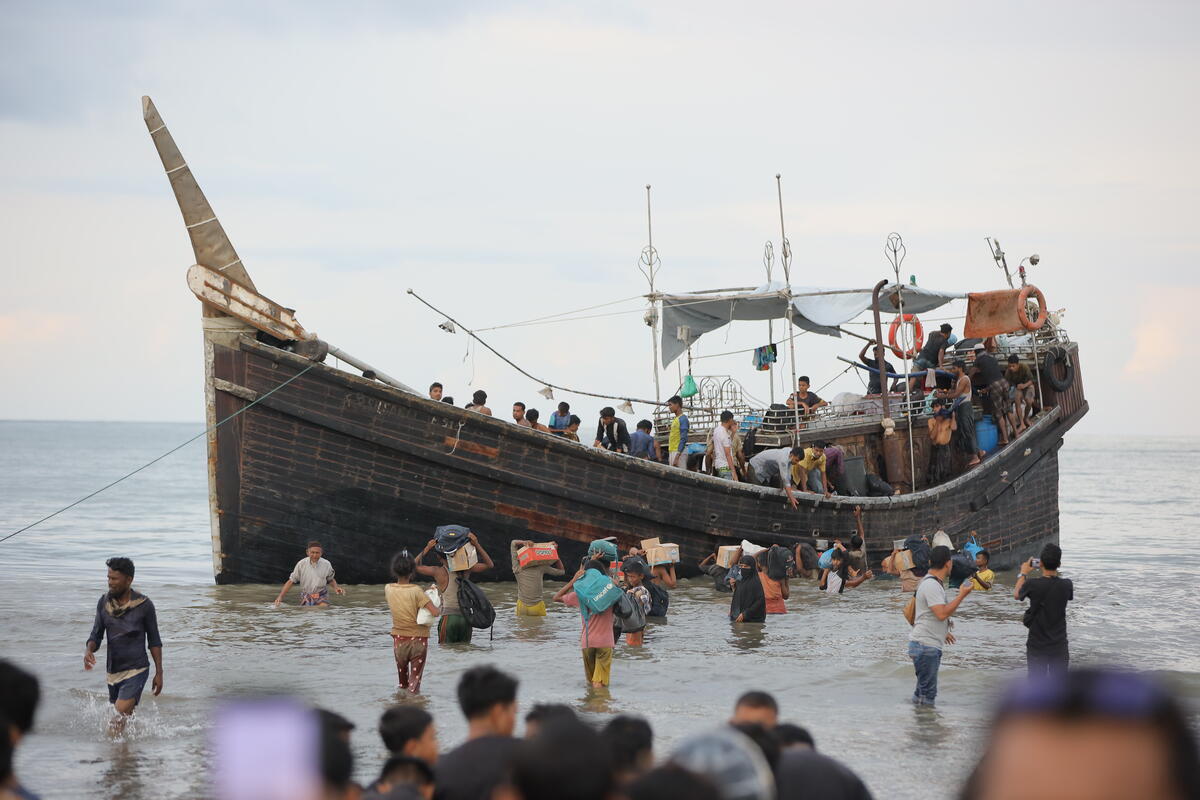
Rohingya refugees arrive in Ulee Madon in Indonesia’s Aceh Province in November 2023 after completing the dangerous crossing from Bangladesh. © UNHCR/Amanda Jufrian
Increasing insecurity and restrictions in camps in Bangladesh are driving growing numbers of stateless Rohingya refugees to board smugglers’ boats
By Mitra Salima Suryono in Aceh, Indonesia
Jannatara, 18, was six months pregnant and recently widowed when she boarded a boat from Bangladesh where she had been living in one of the sprawling camps for Rohingya refugees since fleeing persecution and violence in Myanmar in 2017.
After her husband was killed by unknown people in the camp last year, her parents had convinced her to leave for Indonesia.
“My parents said, ‘You are sad, your life is broken, and you cannot work in Bangladesh’. So, my mother decided that I should go,” she said.
“We spent 45 days on the boat. It was a difficult situation for me because I was pregnant. The whole time while on the boat, I kept praying, ‘Allah save me’.”
The boat finally arrived in Indonesia’s Aceh province three months ago. Now, she and her 10-day-old baby are sheltering in the basement of a convention hall building along with some 120 other Rohingya refugees who arrived at the end of last year.
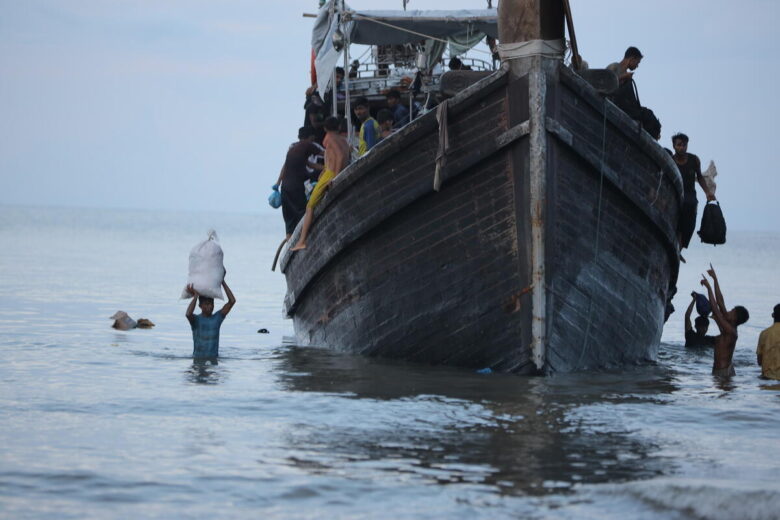
Rohingya refugees unload their belongings at Ulee Madon in Indonesia’s North Aceh Province in November 2023 after arriving from Bangladesh. © UNHCR/Amanda Jufrian
Deadly route
They are among nearly 2,000 Rohingya refugees, most of them women and children, who have arrived in Indonesia’s Aceh and North Sumatra provinces on 13 boats since November 2023.
Earlier this year, UNHCR, the UN Refugee Agency, described such sea journeys as among the deadliest in the world, with estimates showing that one Rohingya died or went missing for every eight who attempted the journey in 2023. In the latest tragedy, a boat carrying 151 Rohingya refugees capsized off the coast of West Aceh on 20 March. Rescue operations were only able to save 75 of them.
After witnessing the killing of her parents and siblings in Myanmar six years earlier, Sofia, a 33-year-old mother of six, said she and her husband made the decision to leave Bangladesh due to the increasing insecurity and lack of educational opportunities in the camps. “I thought my children’s future could be ruined there so we decided to take the boat.”
Before the boat departed, the smugglers gathered hundreds of people in the woods and then loaded them onto several different boats. Sofia’s boat was at sea for 16 days.
“On the fifth day, we ran out of food and water.”
Sofia, 33, Rohingya refugee
“On the fifth day, we ran out of food and water,” she said. “And then a women died. We all prayed for her in Islam rituals and then we threw the body to the sea. For 10 days, there was not enough clean water, so the children drank sea water that we mixed with lime.”
She was travelling with five of her children and each of them fell ill during the journey. They have all since recovered three months after arriving in Aceh where they are staying with 130 other Rohingya refugees at Kulam Batee site next to the beach in Pidie.
Living conditions at the camp in Aceh are difficult and overcrowded with the refugees living in communal, open-sided tents that offer little protection from the elements. Recently, Sofia’s youngest child fainted from the heat. “There was foam coming from her mouth; I thought she had died,” said Sofia.
Her greatest wish now is to be reunited with her oldest son, Shofiuddin, who came to Indonesia several years ago with a relative. Now aged 15, he is attending school in Medan, capital of North Sumatra province.
Sohidul, 24, who is also staying in the convention hall basement, had just secured a job teaching English at one of the camp learning centres in Bangladesh when a spate of kidnappings for ransom drove him to board a boat. “If they got me, they want money [and] I have no money,” he explained. “If my family didn’t pay, they will kill me. That’s why I left; because of fear.”
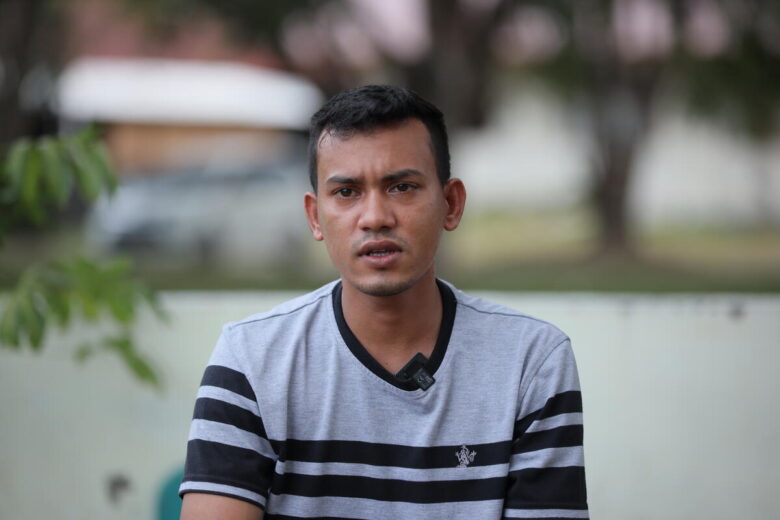
Sohidul, 24, boarded a boat for Indonesia following a spate of kidnappings in the refugee camp in Bangladesh where he lived and worked. © UNHCR/Amanda Jufrian
The refugees have faced a mixed reception after arriving in Indonesia. Some boats have been prevented from landing, a response heavily influenced by an online campaign of misinformation, disinformation, and hate speech against the Rohingya.
Despite this, many local Acehnese continue to show them solidarity and support. At the convention hall site, local people often bring food, clothes and other donations for the refugees while their basic needs are provided for by UNHCR and its partners.
“I am thankful to the people in Indonesia,” said Jannatara. “When I was still pregnant, everyone helped me in the hospital. Now they also give me the mattress for the baby, the clothes and medical care.”
When Sofia and her family landed in Kulam Batee, local people gave them soap, shampoo, clean drinking water and clothes.
“The Rohingya refugees are no stranger to us, we know that they are not acknowledged as citizens in their home country, and that is why they come here to look for a new life that is decent for them and their family,” said a local villager in Kulam Batee who did not wish to be named. “Sometimes we bring fruit and fish because they obviously can’t just eat rice all the time.”
“However, we can only accommodate and help them temporarily,” he added.
UNHCR support
Working with the authorities to identify longer-term accommodation for the refugees is one of the most pressing priorities for UNHCR as it will allow the agency to maximize protection for the group. UNHCR is also processing the refugees’ asylum claims on behalf of the Indonesian Government, identifying caregivers for Rohingya children who have arrived without family members, and offering counselling to refugees who have experienced sexual exploitation, abuse or other forms of mistreatment. More funding is urgently needed to respond to the likely arrival of more boats and to address the root causes that are pushing Rohingya refugees to leave Bangladesh and preventing them from returning to Myanmar.
Sohidul still dreams of a better future, “because everyone wants to have success in this life, so I want [that] too. I will try to be a graphic designer.”
Sofia’s hopes are mainly for her children. “I know that I can’t stay in Indonesia permanently, but I hope there will be another country that will take us … I have no preference as long as they allow us to live in peace.”
Originally published by UNHCR 25 April 2024.



